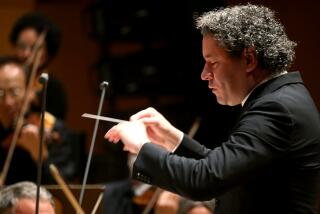Aida Mulieri-Dagort; Harpist Heard in Many Film Scores
- Share via
Growing up in Los Angeles, the little girl had the idea that one’s profession was decided by nationality. Her Italian ancestors had been troubadours, and her violinist father conducted orchestras for Hollywood’s silent movies.
So music must be her profession. She chose the harp. And for her concert stage, she focused on her hometown film studios.
Aida Mulieri-Dagort, a professional harpist whose singing strings were heard in classic film soundtracks from “Bambi” to “Sunset Boulevard” and “The Ten Commandments,” died Friday of a brain tumor at her home in Rancho Mirage. She was 82.
“Our legacy to future generations will not be our literature or our music,” she told the Desert Sun last September. “But it will be our films--that’s the greatest thing we did this century in the arts.
“And the music for the films was all part of making it what it was. It was a combination of everything, of all the wonderful people who worked on the films.”
Long before synthesizers replaced 60-piece orchestras, and when women were barely represented in those orchestras, Mulieri-Dagort played the harp under contract to Warner Bros. from 1942 to 1948 and for Paramount from 1949 to 1968.
Her magical sounds graced the scores of such memorable films as “Casablanca,” “The Maltese Falcon,” “The Treasure of Sierra Madre,” “Duel in the Sun,” “Samson and Delilah,” “The Rose Tattoo,” “Vertigo,” “A Place in the Sun” and “Breakfast at Tiffany’s.”
During World War II, Mulieri-Dagort provided musical backgrounds for Army demonstration films. She also accompanied the caricatures in Looney Tunes.
The young harpist took a bold route to get her toe in the studio door: When she heard that composer Max Steiner and his wife, a studio harpist, were divorcing, she went to the Steiner house and talked to him about a job.
“I left feeling like this was the biggest waste of time,” she said last year. “But about three months later, I got a call at about 3 a.m. from his wife, who said they needed a harpist at Warner Bros. the next morning.”
She was at the studio, harp in tow, at 9 a.m. sharp.
Mulieri-Dagort kept plucking the strings despite sex discrimination and heavy competition for studio musician jobs. What finished her career, she believed, was the Communist Party.
“We had a communist cell right in our own orchestra,” she told the Desert Sun, discussing the McCarthy era. “Their job was to break up the musicians union, and eventually they did. The whole union fell apart. After that, it was every man for himself.”
The year after the union dissolved, Mulieri-Dagort said, she made only $2,000.
Before her film career, she had performed on the concert stage. A Times reviewer noted after a 1941 concert at the Embassy Auditorium that “the harpist was in high favor with the audience.”
But by the time she left the film studios, Mulieri-Dagort was ready to abandon the harp and, for the first time in her life, grow long fingernails. She taught children with learning disabilities at the Fernald School at UCLA and then started painting.
Last year, she published memoirs, “Harps Are Not for Angels.”
Mulieri-Dagort is survived by her husband of 55 years, Vincent Dagort, and their son, production designer Philip Dagort.
The family has asked that any memorial donations be made to the Infinity Fund for Brain Cancer Research at the UCLA Neuro-Oncology Program, 710 Westwood Plaza S. 1-230, Los Angeles, CA 90095.
More to Read
The biggest entertainment stories
Get our big stories about Hollywood, film, television, music, arts, culture and more right in your inbox as soon as they publish.
You may occasionally receive promotional content from the Los Angeles Times.










